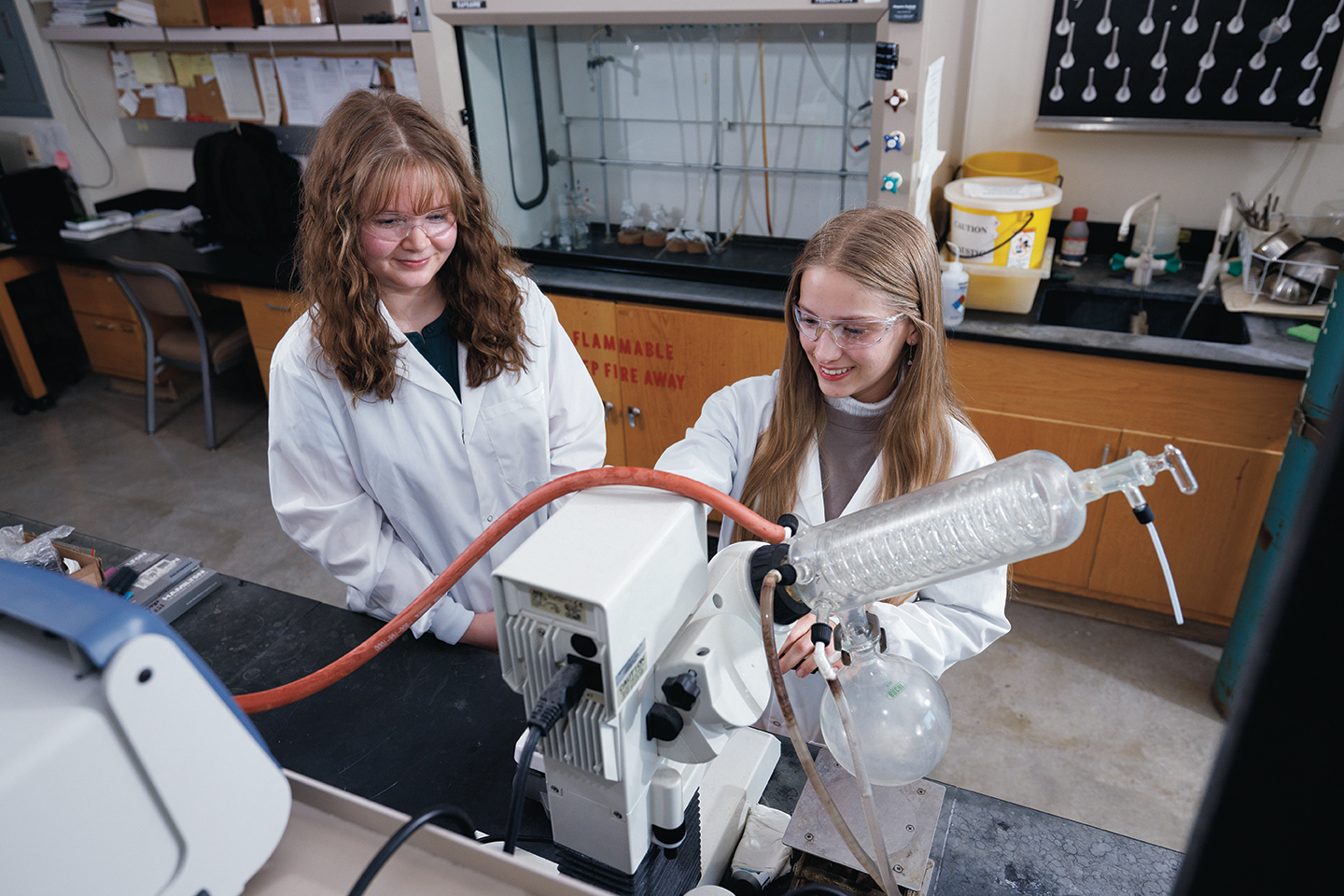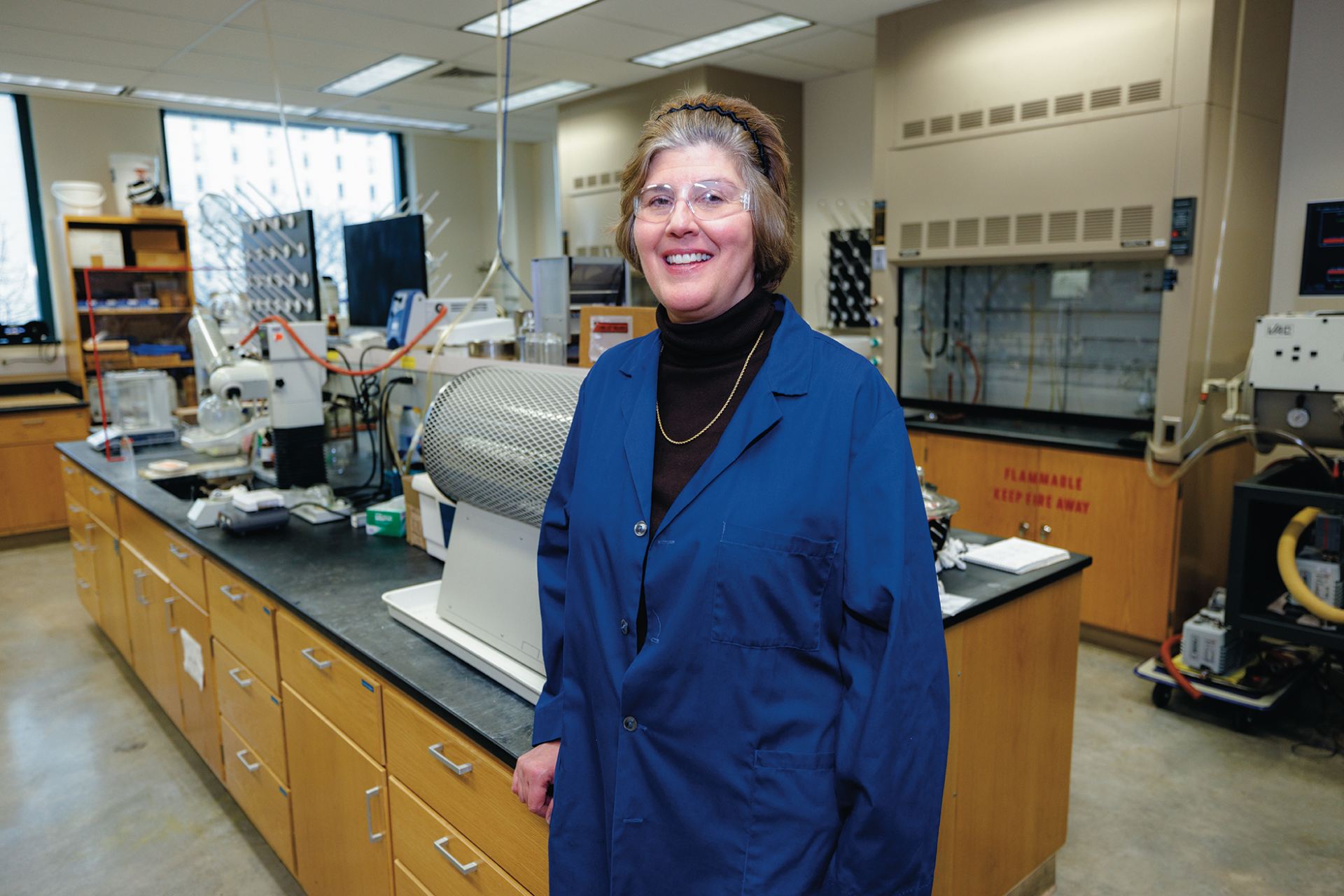The tasks required to apply for the Goldwater Scholarship application—research essays, transcripts, letters of recommendation, etc.— had given Sage Lauper-Cook pause as a sophomore, but she felt up to the challenge to apply as a junior. However, she was distressed when she discovered an internal deadline had passed, through no fault of her own, and thought she had missed her chance. “It was so frustrating,” Lauper-Cook, of Mount Zion, said.
Fellow chemistry major Katherine Helmink also waited to apply until her junior year, and then found herself overwhelmed when the deadline came around. “It was an intensive application,” Helmink, of Breese, said. “There was so much stuff I had to do, and all my classes were piling up at that point.”
Appears InThe students turned to their mentor, Dr. Lisa Szczepura, University Professor of Chemistry. “I wouldn’t have applied if it wasn’t for her,” said Lauper-Cook.
The students’ perseverance paid off. Last spring, they were named Goldwater Scholars, among the most prestigious honors for undergraduate student researchers. The award recognizes students who have excellent academic records and demonstrated potential for research careers in the natural sciences, mathematics, or engineering.
Lauper-Cook and Helmink were among only 413 nominees selected by the Barry Goldwater Scholarship and Excellence in Education Foundation from an initial pool of more than 5,000 sophomores and juniors from across the country. It was the second consecutive year Illinois State students received the award—physics major Ian Freeman won in 2022—but the first time in university history that a pair of students from the same research laboratory won the scholarship in the same year. “It’s definitely an honor,” Lauper-Cook said.
Szczepura said both students are very smart and have excelled academically. Furthermore, they have extraordinary technical ability in the laboratory and are tenacious. These traits separate them from some of their peers. “I was over the moon (when they both won),” Szczepura said. “I’m really proud of them. I know they faced challenges, but they’ve been able to beat them and succeed.”
The seniors have shown that same resolve in Szczepura’s inorganic chemistry lab, where, for the last three years, they have been building the skills and resumes that helped them earn the scholarship.
The professor’s four-member student research group conducts chemical syntheses with transition metals, primarily rhenium, a precious metal. “The work is technically very challenging,” Szczepura said. “We’re not just mixing things in a beaker. We’re designing new substances that are not easy to prepare and we often work with substances that are sensitive to air and water.” Learning to handle and manipulate these compounds requires skill and patience, both of which Sage and Katie have demonstrated.
“Most people, when they think about metals, think about bulk metals, right? Metals in jewelry, things like that,” Szczepura said. “We’re looking at clusters of metals. The clusters that we work with have six metals bonded together with specific geometry. Through synthesis we change things that are bonded to what is called the cluster core, then study how, by changing those things, we can vary the reactivity of the system.
“We’re making compounds nobody’s ever made before. So we look at our characterization and whether this proves the structure is what we think we have. So there’s a lot of data analysis.”
Lauper-Cook and Helmink work on related but separate research projects. Helmink focuses on the preparation of rhenium clusters containing carbon donor ligands. Research in this area of organometallic chemistry has broad applications in catalysis.
Lauper-Cook’s research is more focused on measuring the physical properties displayed by these novel substances. She is currently studying spectroscopic properties related to how these metal-based inorganic compounds emit light upon irradiation (properties similar to those in luminescent glow sticks).
While Szczepura’s research team conducts basic science, they have begun collaborating with chemists at Stony Brook University in New York on an applied research project involving energy storage. The latter group is testing whether compounds created through the Illinois State group’s synthesis research could be used as cathode materials for lithium-ion batteries.
Projects like this offer Illinois State undergraduates the type of research experience reserved for graduate students at larger research universities.
“We’ve both been able to do technical work here,” Helmink said. “We’re able to run our own experiments and do our data collection. The program is very good at making sure that you get that experience at the undergrad level.”
In the summer of 2022, Szczepura asked Helmink to conduct experiments needed to finish a project that was started by a master’s student who had graduated. The body of research Helmink conducted was significant, earning her co-authorship on an article published in the American Chemical Society journal Organometallics. That same summer Lauper-Cook conducted research at Georgia Southern University through the National Science Foundation Research Experiences for Undergraduates program. Both students expressed how these research experiences were instrumental in their Goldwater application materials.
The students have also obtained funding for their research, beyond the Goldwater Scholarship, for which they received $7,500 in financial assistance. Helmink garnered a departmental grant, and both students earned FIREbird (Faculty-mentored Independent Research Experiences) grants last summer from Illinois State’s Office of Student Research.
All of this experience and the Goldwater Scholarship are helping them reach their next step: graduate school, where they plan to further their studies in chemistry and continue researching.
“The Goldwater Scholarship is a good thing to have on your resume, so it was worth it in the end,” Helmink said.
Helmink and Lauper-Cook appreciate their mentor for all that she has taught them and the extensive research experience they’ve gained under her tutelage. “What I enjoy doing is working with students in the lab and seeing them grow in terms of their technical ability and their ability to analyze data,” Szczepura said. “Both students have done a great job of taking advantage of the opportunities that the department has to offer and Illinois State in general, and I am confident that they are both going to excel in graduate school as well.”
Goldwater Scholars have gone on to win an impressive array of prestigious postgraduate fellowships due to recipients being marked as having the highest potential to succeed. And this award will likely open doors for Lauper-Cook and Helmink throughout their STEM careers.


